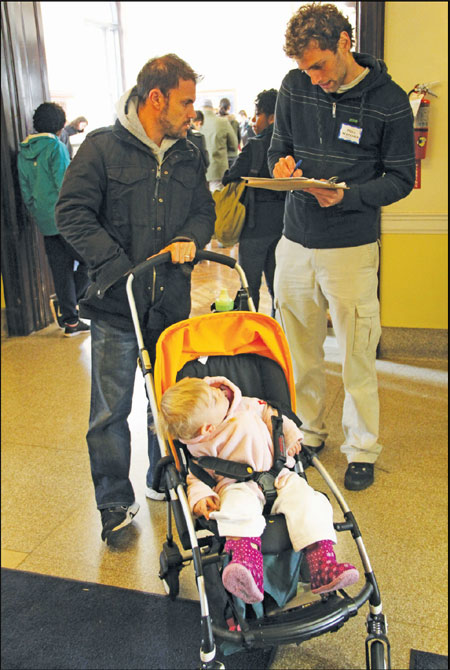Gun violence worries Chicagoans even as candidates remain silent
|
Gabriel Pestre (right), a 21-year-old Columbia University sophomore, helps a voter at a polling place in New York City. New York Wei Wei / for China Daily |
Chicago, the third-most-populous US city and Barack Obama's adopted hometown, has a problem that worries locals but was largely ignored throughout the presidential campaign: gun violence.
Through Oct 29, the number of homicides this year in Chicago stood at 438, three more than in all of 2011, according to police. This is the first time since 2008 that homicides in the city have increased from the previous year. Though more populous, both New York and Los Angeles have had fewer homicides so far in 2012.
About two-thirds of homicides in the United States involve the use of a firearm, according to the United Nations Office on Drugs and Crime.
Tio Hardiman, director of CeaseFire Illinois, which works to quell street conflicts before they turn lethal, is among those who think Chicago's homicide total may exceed 500 this year. Conflicts between gangs are the main culprit in the surge in citywide gun violence of recent years, he told China Daily.
"Violence is like an infectious disease," Hardiman said. "It has become the norm for a lot of people. You have to make them become human again."
Although top officials in Chicago and Illinois, including Mayor Rahm Emanuel - Obama's former White House chief of staff - and Governor Pat Quinn have been pushing for stricter gun-control measures, Hardiman believes more must be done to reduce the availability of handguns and other weapons on the black market.
Colleen Daley, executive director of the Illinois Council Against Handgun Violence, said the problem isn't plaguing Chicago alone, but the entire country.
On an average day in the US, according to Daley's group, 32 people are killed and 64 others wounded in violent acts involving guns. On one October weekend in Chicago, about 30 people were shot, five of them fatally, in several armed incidents.
Illinois and Chicago already have some of the nation's toughest gun-control laws. But Daley, who isn't related to the local political family of the same name, would like to see the implementation of measures such as mandatory reporting of guns lost by law enforcement and detailed background checks for gun buyers.
Without these safeguards, people will continue to find it easy to sell guns that make it to the street, Daley said. "It's common sense, but we don't have this law in the book," she told China Daily.
Last week, officials in Cook County, which includes Chicago, approved a tax on firearms to help pay the cost of health care associated with gun violence. The $25 levy on each firearm sold in the county is believed to be the first such tax in a major US metropolitan area.
Daley believes the roots of gun violence run so deep, there is no single solution to the problem.
"It comes down to a lot of basic things. We have to find jobs for people. We have to make sure that children at home have a family and have an alternative and don't turn to violence.
"It's a societal issue," she said.
A month ago, a local African-American minister led some 200 marchers to Chicago's streets for an anti-violence rally. Chicago Ideas Week, an annual event mean to tackle big issues, this year invited city residents to submit ideas through Twitter for reducing gun mayhem.
Chicagoan Bruce Downs worries about his grandson, who was shot last weekend in Los Angeles.
"Gun violence is a huge issue all across the country," he said at a Starbucks on North Michigan Avenue. "There definitely needs to be more stringent regulations for gun ownership."
"The registration process now seems to be a farce. It's just at a surface level. More deep investigation is needed," said Downs, who also believes the type of guns allowed for sale should be limited.
Daley, of the Illinois anti-gun council, acknowledged that gun control in the US is widely seen as having little or no political upside, given the fierce gun-rights advocacy of the National Rifle Association and other groups. But the epidemic has captured many Americans' attention, not least of all due to mass killings in Aurora, Colorado, and other places.
Neither Obama nor Republican rival Mitt Romney addressed the problem of gun violence in a substantive way during the presidential campaign. Both failed to propose new gun-control legislation, for fear of antagonizing the powerful gun lobby.
"I hope that if the president is elected for a second term, he will do a bit more than in his first term," Daley said. "Romney was for the assault-weapons ban, and he signed one in Massachusetts (as governor). I hope he could do so nationally."
chenweihua@chinadaily.com.cn



















